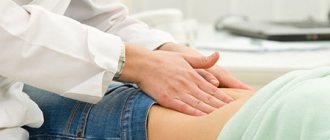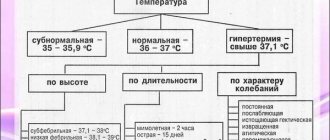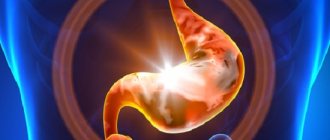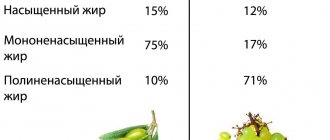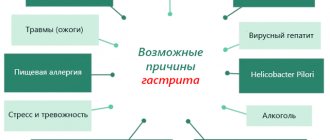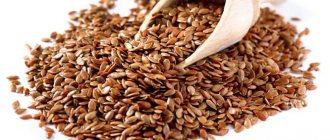Gastritis with high acidity is an inflammation of the gastric epithelium (acute or chronic), accompanied by an increase in the pH of gastric juice. Manifested by epigastric pain, dyspeptic symptoms (heartburn, belching, diarrhea). The diagnosis can be established using a number of clinical and instrumental studies, the main of which is FEGDS with pH-metry of gastric juice, biopsy of the mucous membrane and testing for the presence of Helicobacter pylori infection. Treatment includes diet, antacids and proton pump inhibitors, gastroprotectors, and antibacterial therapy for Helicobacter pylori infection. During periods between exacerbations, active sanatorium-resort treatment and physiotherapeutic procedures are carried out.
General information
Gastritis with high acidity is an inflammatory process that occurs in the stomach under the influence of H. pylori infection. Provoking factors that cause acute hyperacid gastritis or exacerbation of chronic gastritis can be errors in nutrition, stress, or taking certain medications. Gastritis with high acidity most often occurs in young people, often in children. This is due to changes in nutritional culture - more and more people eat on the go, fast food, irregularly, which as a result leads to severe stomach damage.
Long-term chronic gastritis with increased acidity can lead to serious complications, in particular gastric or duodenal ulcers. A big problem that provokes worsening of the condition with gastritis is self-medication with the uncontrolled use of drugs and folk remedies that have antacid properties. Taking these medications without the prescription and supervision of a gastroenterologist can cause a serious disorder of gastric secretion, which will ultimately provoke atrophy of the gastric glands and mucous membrane and lead to irreversible consequences.
Chronic gastritis is considered the most common disease in modern gastroenterology - it affects at least 50% of the population. It is known that histological signs of mucosal inflammation are found in half of the subjects who have never complained of dyspeptic disorders, and in those who complained of dyspepsia, such changes are found in 45% of patients.
Gastritis with high acidity
Increased salivation in women during pregnancy
A common cause of hypersalivation in women is pregnancy. When a woman is preparing to become a mother, the hormonal background of the body changes greatly, and with it many processes: blood circulation, digestion.
Pregnancy affects all systems at once:
● endocrine;
● nervous;
● digestive.
Often, expectant mothers experience problems with their teeth and gums, such as gingivitis. This disease also affects the amount of saliva produced.
Healthy and inflamed gums
Causes
To date, it has been proven that the leading cause of the development of gastritis with high acidity is infection of the mucous membrane with Helicobacter. There is a direct connection between the number of bacteria and the severity of gastritis. Helicobacter pylori infection affects only the epithelial cells of the stomach - this is confirmed by many studies in which the bacterium was found in the duodenum only in areas of the epithelium that had metaplasticized into the gastric epithelium.
These bacteria have a special structure and a number of protective mechanisms that allow them to survive and reproduce in the aggressive environment of the stomach. They are able to create an alkaline cocoon around themselves and penetrate deep into the mucosa, destroying stomach cells and protective barriers that prevent gastric juice from affecting its own mucosa. Under the influence of ammonia, which is produced by microorganisms, the secretion of gastrin increases, and the level of somatostatin decreases - all this leads to an increase in the secretion of hydrochloric acid and an increase in the acidity of gastric juice. Also, multiplying bacteria provoke the release of pro-inflammatory prostaglandins and the inflammatory process in the mucous membrane.
Errors in nutrition provoke the progression of Helicobacter pylori infection: eating on the go, in a hurry, dry food, frequent consumption of too cold or hot foods, fried and extracted. Often this type of gastritis occurs in people who abuse alcohol, smoking, and strong coffee. The course of the infection also worsens under the influence of radiation, taking certain medications, and allergies to certain foods. Exacerbations of gastritis often occur against the background of severe stress.
There are a number of internal factors that contribute to the development of hyperacid gastritis: severe chronic infections, metabolic disorders (diabetes mellitus, thyroid diseases, gout and others), oxygen starvation. Duodeno-gastric reflux (reflux of the contents of the small intestine into the stomach through the pylorus) has an important pathogenetic significance - the entry into the stomach of alkaline intestinal contents and especially bile causes additional damage to the gastric mucosa, reducing its resistance to the effects of hydrochloric acid. Often inflammation in the stomach develops against the background of other serious diseases due to reflex effects.
Causes of increased salivation at night in adults
During sleep, processes in the body go slower, including the secretion of saliva. But glitches may occur. Here are the main factors that cause too much saliva to be produced during sleep:
● breathing through the mouth, not through the nose - often happens when a person sleeps on his back;
● malocclusion – the mouth remains open during sleep, the tongue dries out and the body decides that more saliva is needed;
● poor sleep - too much sleep when a person is not sure that he is sleeping. This can lead to the body considering the dream as reality and secreting saliva as if during the day.
This is what an open bite looks like - the tongue protrudes forward
Pathogenesis
Normally, the gastric mucosa has a powerful protective system that protects it from exposure to the aggressive gastric environment. However, under the influence of certain factors, protective barriers can be weakened, creating favorable conditions for the inflammatory process. These factors include: constant physical and moral fatigue, various occupational hazards, hereditary characteristics of the body, weakening of the body against the background of severe concomitant diseases.
How to understand that salivation is increased: symptoms and signs of failure
Saliva is involved in many important processes occurring in the human body. When everything is normal, we do not notice that saliva:
● helps to pronounce words and sounds clearly and correctly;
● enhances the perception of the taste of food and drinks;
● participates in digestion - helps to chew food and also swallow it.
When salivation is increased, several processes are disrupted at once:
● the taste of food changes - salty food becomes too pronounced, and subtle nuances are not felt;
● problems with diction appear – pronouncing some sounds is problematic;
● it becomes painful to swallow food.
Location of glands
In addition to indirect signs, there are also clear, measurable criteria. If more than two milliliters of saliva is released within five minutes, the patient is diagnosed with increased salivation. The normal value is 2 ml.
Sometimes patients complain of false profuse salivation. This happens when there is injury or inflammation in the mouth and it may seem that there is more saliva than there should be, although the levels are normal: 2 ml in 5 minutes or 2 liters per day.
Symptoms of hyperacid gastritis
Exacerbations of chronic gastritis usually occur in the autumn-spring period. This is expressed in the appearance of pain in the epigastric region, often after eating. The pain is dull, aching, and occurs due to stretching of the damaged mucosa by food masses. The pain is often accompanied by a feeling of heaviness and burning in the upper abdomen, which goes away after vomiting. Pain is typical at night and on an empty stomach - in the absence of food in the stomach, hydrochloric acid has a very aggressive effect on its own mucosa. The patient is concerned about nausea, heartburn (reflux of acidic stomach contents into the esophagus), belching or regurgitation of acid (reflux of air and gastric contents into the oral cavity). Sometimes vomiting develops after eating; the vomit contains mucus and bile. Vomiting may provide pain relief. Indigestion in the stomach also leads to disruption of the functioning of other gastrointestinal organs - diarrhea develops, and constipation is less common.
The general symptoms are also quite specific for gastritis: very severe weakness with episodes of excessive sweating, dizziness. Appetite is reduced, the stomach periodically swells (flatulence), and grumbles. There is increased salivation, the tongue is coated, teeth marks remain on it, and an unpleasant odor appears from the mouth. Changes in the cardiovascular system may be observed: pain in the heart area, palpitations and pressure lability - such symptoms are caused by reflex influences.
Treatment of increased salivation
Depending on the cause of hypersalivation, different doctors provide treatment:
● dentists solve problems of local oral diseases;
● endocrinologists for hormonal disorders;
● gastroenterologists, if the problem is diseases of the digestive system;
● neurologists, if the failure is due to problems with the central nervous system.
A dentist will help identify the cause, and a therapist will refer you to a specific specialist.
Treatment with medications
In addition to eliminating the causes associated with disruption of the internal organs, the doctor may prescribe medications that eliminate the symptoms. For example:
● riabal;
● scopolamine;
● platiphylline.
Taking medications without a doctor's prescription is prohibited!
We do not recommend purchasing or taking medications without consulting a doctor. Each drug has contraindications and side effects: from glaucoma to liver, heart, and vascular diseases.
You should not risk your life and health to save time or money on a visit to the clinic.
Botox treatment
For short-term symptom relief, Botox injections are sometimes used. It blocks nerve signals, reducing tubule activity. This method helps to quickly get rid of the problem, but, unfortunately, the effect does not last long.
Facial massage and muscle relaxation
It will help if the cause is related to nervous tension, stress or central nervous system pathologies.
Removal of glands
It is prescribed extremely rarely, only in cases where all other methods and elimination of the causes of the disease have not helped. Removal, even partial, can damage the facial nerves.
Diagnostics
Correct diagnosis of gastritis with increased acidity of gastric juice requires a series of clinical, functional and instrumental examinations. Changes in clinical tests are nonspecific for gastritis - an increase in inflammatory elements may be noted. With concomitant damage to other organs, corresponding changes appear in the biochemical blood test. If there are erosions in the stomach and bleeding from them, occult blood is determined by a special analysis in the stool. Research is required to search for H. pylori: urease breath test, ELISA and PCR analysis to detect antibodies and DNA of the microorganism, respectively. Also, a large number of bacteria can be detected during endoscopic biopsy of the gastric mucosa and histological examination.
If gastritis is suspected, it is mandatory to perform gastroscopy, or better yet, FEGDS - a special instrument with a video camera is inserted into the stomach, allowing you to examine the esophagus, stomach and duodenum, identify the inflammatory process, erosions and ulcers. During the study, tissue must be taken for biopsy from several places. pH-metry is also carried out - measuring the acidity of gastric juice; if it is less than 1.5 - they speak of hyperacid gastritis. Pieces of tissue taken during a biopsy are examined by histologists - signs of inflammation are determined, and a huge number of Helicobacter bacteria can be detected.
The pressure in the stomach cavity is measured, electrogastroenterography is carried out - they help identify duodenogastric reflux, which also aggravates the course of the disease. As auxiliary diagnostic methods, it is possible to perform ultrasound, CT or MSCT of the abdominal organs, but for gastritis they are not of decisive importance; they only allow to identify concomitant damage to other organs.
Treatment of hyperacid gastritis
Treatment is carried out by a mood enterologist. During exacerbation, hospitalization is indicated. The very first condition for reducing symptoms is following a diet, giving up alcohol, smoking, and coffee. Dietary table No. 1 is prescribed: food should be thermally, chemically and mechanically gentle until the symptoms of the disease are alleviated. After the condition improves, a strict diet is followed - food is steamed and eaten often, in small portions. Fried, smoked, extractive substances, carbonated drinks and alcohol are excluded. Long breaks between meals, eating on the go and dry food are not allowed.
Conservative therapy for gastritis with increased acidity of gastric juice includes a number of drugs. Proton pump inhibitors (reduce the production of hydrochloric acid), antacids (neutralize acid), gastroprotectors (create a protective barrier on the surface of the mucosa), antispasmodics and drugs that improve the motility of the gastrointestinal tract are prescribed. An important component of therapy is antibacterial therapy aimed at destroying Helicobacter. As a rule, anti-Helicobacter therapy for hyperacid gastritis should consist of three or four components.
Physiotherapeutic treatment allows you to enhance the effect of medications or deliver them directly to the stomach. Electrophoresis with antispasmodics relieves pain and improves gastric motility. This is also facilitated by applying heating pads and thermal applications to the stomach area. Electrotherapy and magnetic therapy not only reduce pain, but also accelerate the healing of the mucous membrane. Sanatorium-resort treatment is provided in the period between exacerbations, including therapy with mineral waters (hydrotherapy).
Prognosis and prevention
The prognosis for timely and complete treatment of gastritis is favorable. If therapeutic measures are not carried out, the patient continues to smoke and drink alcohol, does not follow a diet - severe complications are likely to occur, the disease will progress to gastric and duodenal ulcers. Prevention of gastritis with high acidity includes normalizing your daily routine and nutrition. You should eat healthy food, you need to eat at least 3-5 times a day.
It is recommended to avoid frequent consumption of strong coffee, carbonated drinks, alcohol and smoking. Nutrition should be balanced and include all necessary microelements and vitamins. There is no need to eat dry food; sufficient time should be given to meals - only in this case is it possible to reduce the risk of gastritis to a minimum. You also need to strictly observe hygiene measures designed to protect against infection with Helicobacter pylori infection; you should always wash your hands before eating. All medications should be taken only as prescribed by a doctor and in accordance with the instructions for the drug.
You can share your medical history, what helped you in the treatment of gastritis with high acidity.

